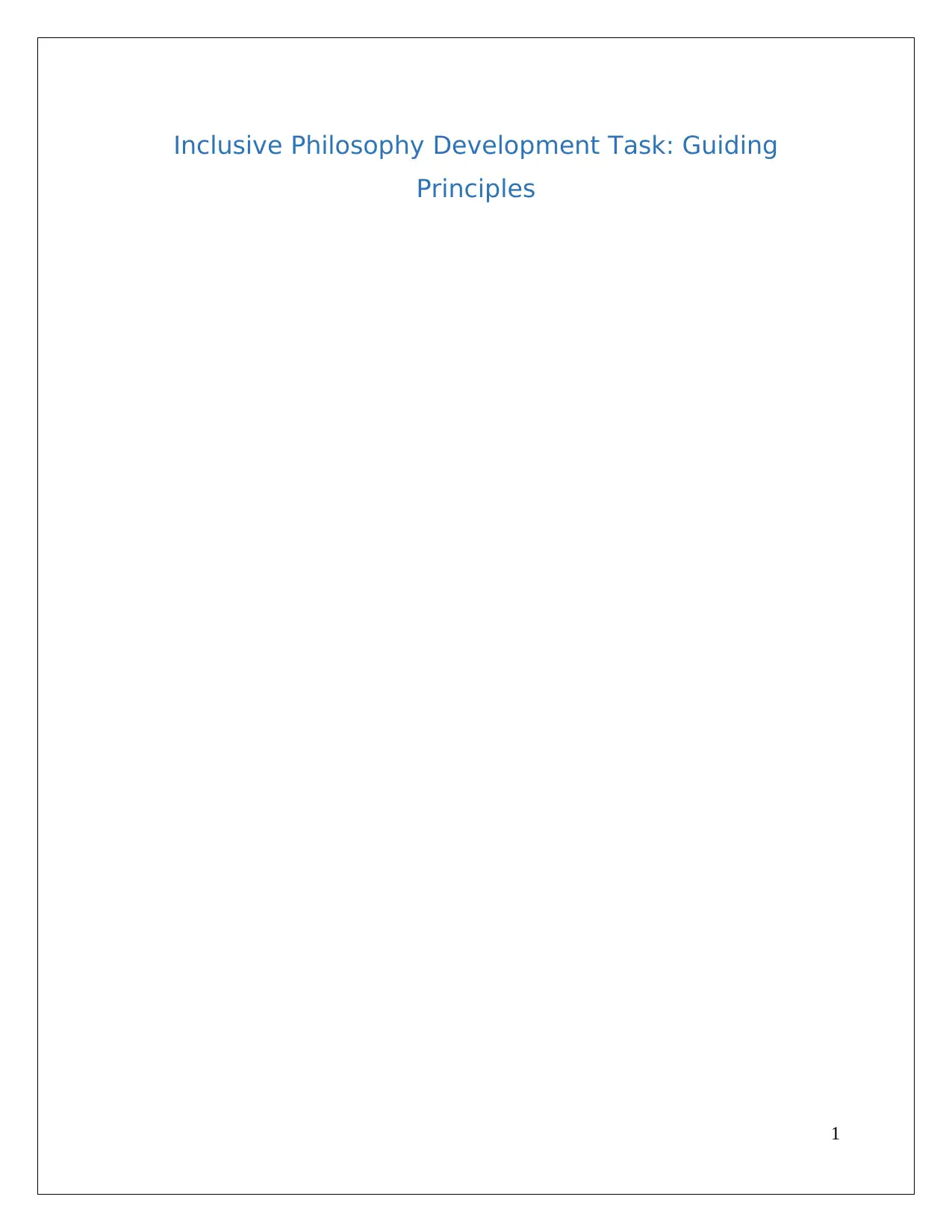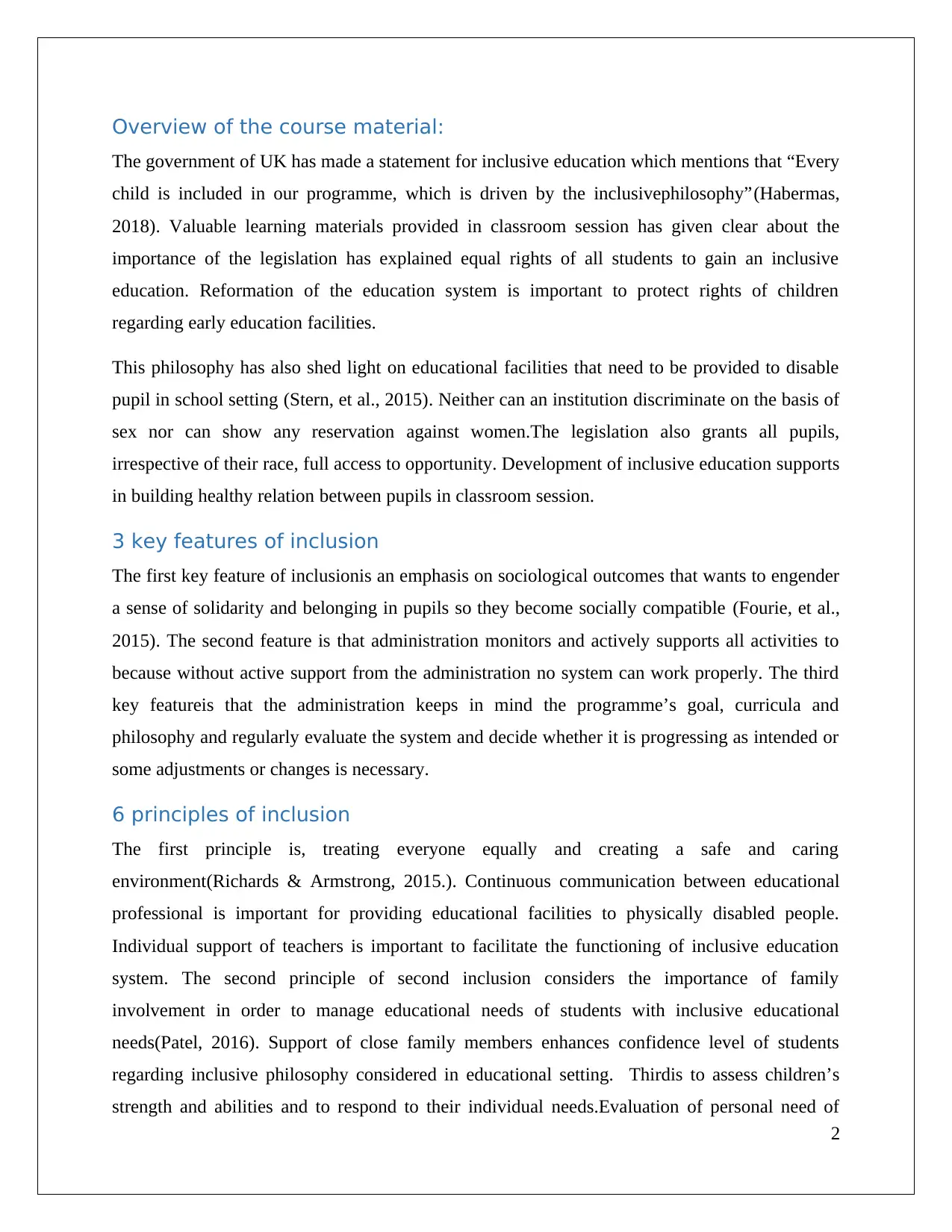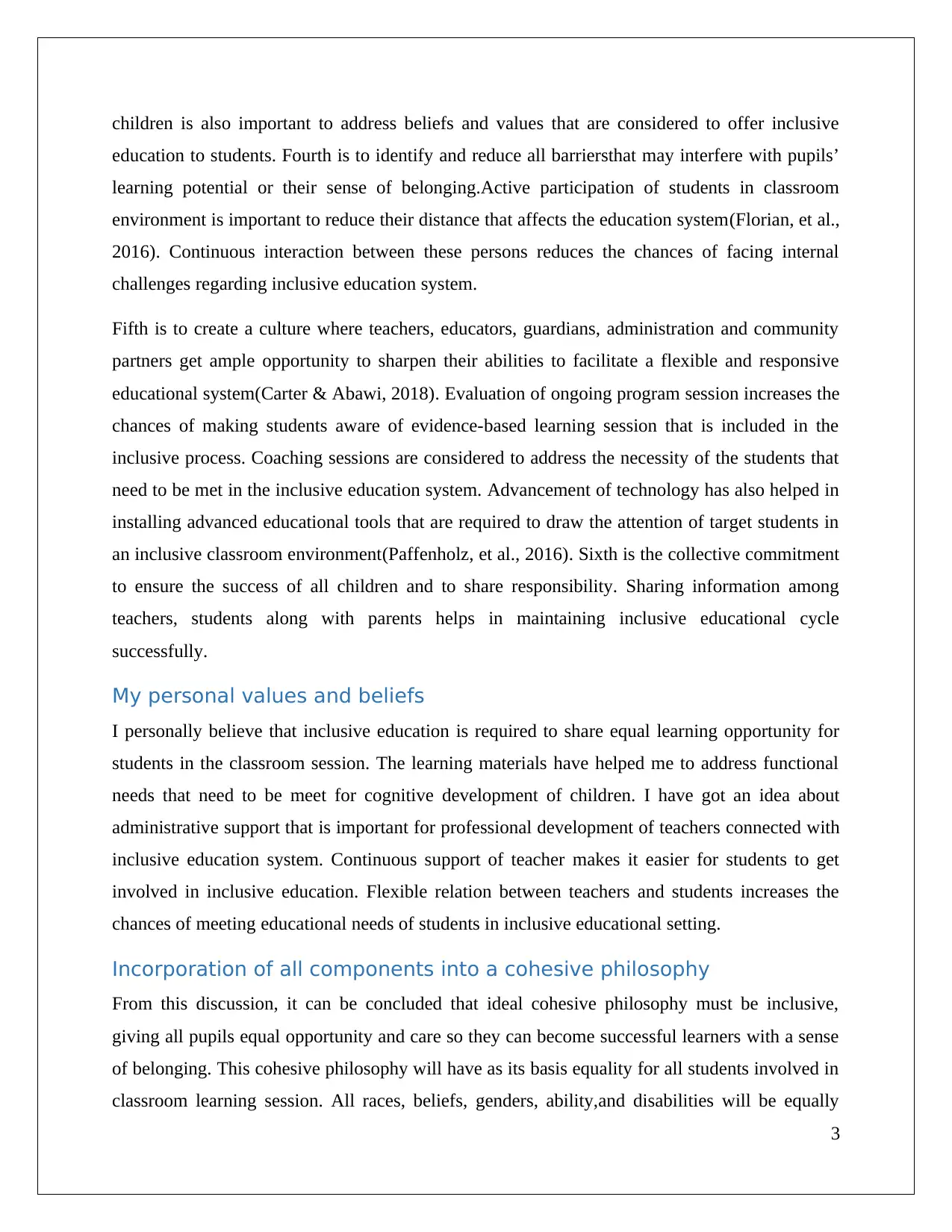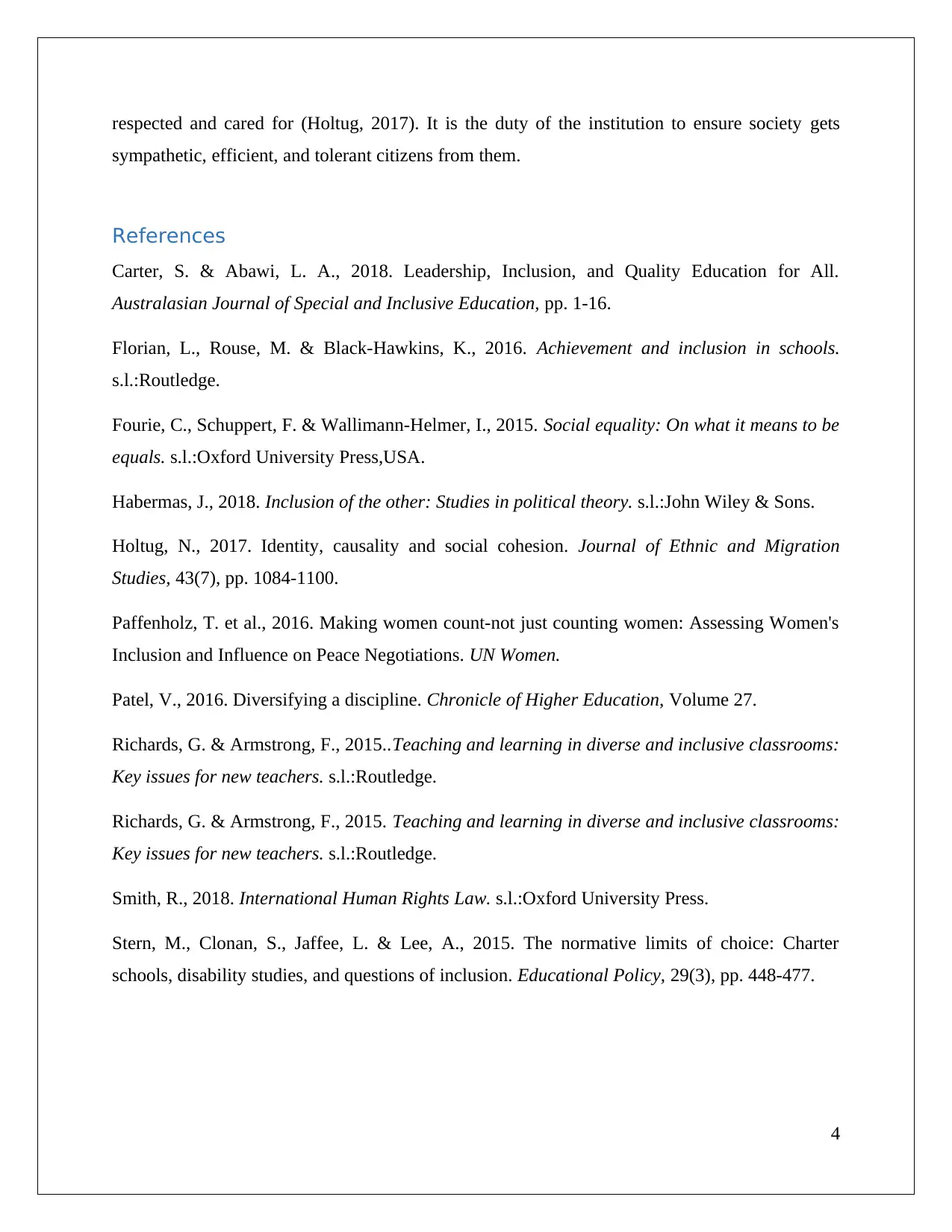Inclusive Education Philosophy: Guiding Principles Development Task
VerifiedAdded on 2023/06/11
|4
|1169
|350
Essay
AI Summary
This essay presents guiding principles for developing an inclusive education philosophy, drawing upon UK legislation, key features of inclusion, and personal values. It emphasizes the importance of equal opportunity, a safe and caring environment, and family involvement in supporting students with diverse needs. The principles also focus on assessing individual strengths, reducing barriers to learning, and fostering collaboration among educators, families, and community partners. The cohesive philosophy aims to create successful learners with a sense of belonging, respecting all races, beliefs, genders, abilities, and disabilities. The institution's duty is to cultivate sympathetic, efficient, and tolerant citizens.

Inclusive Philosophy Development Task: Guiding
Principles
1
Principles
1
Paraphrase This Document
Need a fresh take? Get an instant paraphrase of this document with our AI Paraphraser

Overview of the course material:
The government of UK has made a statement for inclusive education which mentions that “Every
child is included in our programme, which is driven by the inclusivephilosophy”(Habermas,
2018). Valuable learning materials provided in classroom session has given clear about the
importance of the legislation has explained equal rights of all students to gain an inclusive
education. Reformation of the education system is important to protect rights of children
regarding early education facilities.
This philosophy has also shed light on educational facilities that need to be provided to disable
pupil in school setting (Stern, et al., 2015). Neither can an institution discriminate on the basis of
sex nor can show any reservation against women.The legislation also grants all pupils,
irrespective of their race, full access to opportunity. Development of inclusive education supports
in building healthy relation between pupils in classroom session.
3 key features of inclusion
The first key feature of inclusionis an emphasis on sociological outcomes that wants to engender
a sense of solidarity and belonging in pupils so they become socially compatible (Fourie, et al.,
2015). The second feature is that administration monitors and actively supports all activities to
because without active support from the administration no system can work properly. The third
key featureis that the administration keeps in mind the programme’s goal, curricula and
philosophy and regularly evaluate the system and decide whether it is progressing as intended or
some adjustments or changes is necessary.
6 principles of inclusion
The first principle is, treating everyone equally and creating a safe and caring
environment(Richards & Armstrong, 2015.). Continuous communication between educational
professional is important for providing educational facilities to physically disabled people.
Individual support of teachers is important to facilitate the functioning of inclusive education
system. The second principle of second inclusion considers the importance of family
involvement in order to manage educational needs of students with inclusive educational
needs(Patel, 2016). Support of close family members enhances confidence level of students
regarding inclusive philosophy considered in educational setting. Thirdis to assess children’s
strength and abilities and to respond to their individual needs.Evaluation of personal need of
2
The government of UK has made a statement for inclusive education which mentions that “Every
child is included in our programme, which is driven by the inclusivephilosophy”(Habermas,
2018). Valuable learning materials provided in classroom session has given clear about the
importance of the legislation has explained equal rights of all students to gain an inclusive
education. Reformation of the education system is important to protect rights of children
regarding early education facilities.
This philosophy has also shed light on educational facilities that need to be provided to disable
pupil in school setting (Stern, et al., 2015). Neither can an institution discriminate on the basis of
sex nor can show any reservation against women.The legislation also grants all pupils,
irrespective of their race, full access to opportunity. Development of inclusive education supports
in building healthy relation between pupils in classroom session.
3 key features of inclusion
The first key feature of inclusionis an emphasis on sociological outcomes that wants to engender
a sense of solidarity and belonging in pupils so they become socially compatible (Fourie, et al.,
2015). The second feature is that administration monitors and actively supports all activities to
because without active support from the administration no system can work properly. The third
key featureis that the administration keeps in mind the programme’s goal, curricula and
philosophy and regularly evaluate the system and decide whether it is progressing as intended or
some adjustments or changes is necessary.
6 principles of inclusion
The first principle is, treating everyone equally and creating a safe and caring
environment(Richards & Armstrong, 2015.). Continuous communication between educational
professional is important for providing educational facilities to physically disabled people.
Individual support of teachers is important to facilitate the functioning of inclusive education
system. The second principle of second inclusion considers the importance of family
involvement in order to manage educational needs of students with inclusive educational
needs(Patel, 2016). Support of close family members enhances confidence level of students
regarding inclusive philosophy considered in educational setting. Thirdis to assess children’s
strength and abilities and to respond to their individual needs.Evaluation of personal need of
2

children is also important to address beliefs and values that are considered to offer inclusive
education to students. Fourth is to identify and reduce all barriersthat may interfere with pupils’
learning potential or their sense of belonging.Active participation of students in classroom
environment is important to reduce their distance that affects the education system(Florian, et al.,
2016). Continuous interaction between these persons reduces the chances of facing internal
challenges regarding inclusive education system.
Fifth is to create a culture where teachers, educators, guardians, administration and community
partners get ample opportunity to sharpen their abilities to facilitate a flexible and responsive
educational system(Carter & Abawi, 2018). Evaluation of ongoing program session increases the
chances of making students aware of evidence-based learning session that is included in the
inclusive process. Coaching sessions are considered to address the necessity of the students that
need to be met in the inclusive education system. Advancement of technology has also helped in
installing advanced educational tools that are required to draw the attention of target students in
an inclusive classroom environment(Paffenholz, et al., 2016). Sixth is the collective commitment
to ensure the success of all children and to share responsibility. Sharing information among
teachers, students along with parents helps in maintaining inclusive educational cycle
successfully.
My personal values and beliefs
I personally believe that inclusive education is required to share equal learning opportunity for
students in the classroom session. The learning materials have helped me to address functional
needs that need to be meet for cognitive development of children. I have got an idea about
administrative support that is important for professional development of teachers connected with
inclusive education system. Continuous support of teacher makes it easier for students to get
involved in inclusive education. Flexible relation between teachers and students increases the
chances of meeting educational needs of students in inclusive educational setting.
Incorporation of all components into a cohesive philosophy
From this discussion, it can be concluded that ideal cohesive philosophy must be inclusive,
giving all pupils equal opportunity and care so they can become successful learners with a sense
of belonging. This cohesive philosophy will have as its basis equality for all students involved in
classroom learning session. All races, beliefs, genders, ability,and disabilities will be equally
3
education to students. Fourth is to identify and reduce all barriersthat may interfere with pupils’
learning potential or their sense of belonging.Active participation of students in classroom
environment is important to reduce their distance that affects the education system(Florian, et al.,
2016). Continuous interaction between these persons reduces the chances of facing internal
challenges regarding inclusive education system.
Fifth is to create a culture where teachers, educators, guardians, administration and community
partners get ample opportunity to sharpen their abilities to facilitate a flexible and responsive
educational system(Carter & Abawi, 2018). Evaluation of ongoing program session increases the
chances of making students aware of evidence-based learning session that is included in the
inclusive process. Coaching sessions are considered to address the necessity of the students that
need to be met in the inclusive education system. Advancement of technology has also helped in
installing advanced educational tools that are required to draw the attention of target students in
an inclusive classroom environment(Paffenholz, et al., 2016). Sixth is the collective commitment
to ensure the success of all children and to share responsibility. Sharing information among
teachers, students along with parents helps in maintaining inclusive educational cycle
successfully.
My personal values and beliefs
I personally believe that inclusive education is required to share equal learning opportunity for
students in the classroom session. The learning materials have helped me to address functional
needs that need to be meet for cognitive development of children. I have got an idea about
administrative support that is important for professional development of teachers connected with
inclusive education system. Continuous support of teacher makes it easier for students to get
involved in inclusive education. Flexible relation between teachers and students increases the
chances of meeting educational needs of students in inclusive educational setting.
Incorporation of all components into a cohesive philosophy
From this discussion, it can be concluded that ideal cohesive philosophy must be inclusive,
giving all pupils equal opportunity and care so they can become successful learners with a sense
of belonging. This cohesive philosophy will have as its basis equality for all students involved in
classroom learning session. All races, beliefs, genders, ability,and disabilities will be equally
3
⊘ This is a preview!⊘
Do you want full access?
Subscribe today to unlock all pages.

Trusted by 1+ million students worldwide

respected and cared for (Holtug, 2017). It is the duty of the institution to ensure society gets
sympathetic, efficient, and tolerant citizens from them.
References
Carter, S. & Abawi, L. A., 2018. Leadership, Inclusion, and Quality Education for All.
Australasian Journal of Special and Inclusive Education, pp. 1-16.
Florian, L., Rouse, M. & Black-Hawkins, K., 2016. Achievement and inclusion in schools.
s.l.:Routledge.
Fourie, C., Schuppert, F. & Wallimann-Helmer, I., 2015. Social equality: On what it means to be
equals. s.l.:Oxford University Press,USA.
Habermas, J., 2018. Inclusion of the other: Studies in political theory. s.l.:John Wiley & Sons.
Holtug, N., 2017. Identity, causality and social cohesion. Journal of Ethnic and Migration
Studies, 43(7), pp. 1084-1100.
Paffenholz, T. et al., 2016. Making women count-not just counting women: Assessing Women's
Inclusion and Influence on Peace Negotiations. UN Women.
Patel, V., 2016. Diversifying a discipline. Chronicle of Higher Education, Volume 27.
Richards, G. & Armstrong, F., 2015..Teaching and learning in diverse and inclusive classrooms:
Key issues for new teachers. s.l.:Routledge.
Richards, G. & Armstrong, F., 2015. Teaching and learning in diverse and inclusive classrooms:
Key issues for new teachers. s.l.:Routledge.
Smith, R., 2018. International Human Rights Law. s.l.:Oxford University Press.
Stern, M., Clonan, S., Jaffee, L. & Lee, A., 2015. The normative limits of choice: Charter
schools, disability studies, and questions of inclusion. Educational Policy, 29(3), pp. 448-477.
4
sympathetic, efficient, and tolerant citizens from them.
References
Carter, S. & Abawi, L. A., 2018. Leadership, Inclusion, and Quality Education for All.
Australasian Journal of Special and Inclusive Education, pp. 1-16.
Florian, L., Rouse, M. & Black-Hawkins, K., 2016. Achievement and inclusion in schools.
s.l.:Routledge.
Fourie, C., Schuppert, F. & Wallimann-Helmer, I., 2015. Social equality: On what it means to be
equals. s.l.:Oxford University Press,USA.
Habermas, J., 2018. Inclusion of the other: Studies in political theory. s.l.:John Wiley & Sons.
Holtug, N., 2017. Identity, causality and social cohesion. Journal of Ethnic and Migration
Studies, 43(7), pp. 1084-1100.
Paffenholz, T. et al., 2016. Making women count-not just counting women: Assessing Women's
Inclusion and Influence on Peace Negotiations. UN Women.
Patel, V., 2016. Diversifying a discipline. Chronicle of Higher Education, Volume 27.
Richards, G. & Armstrong, F., 2015..Teaching and learning in diverse and inclusive classrooms:
Key issues for new teachers. s.l.:Routledge.
Richards, G. & Armstrong, F., 2015. Teaching and learning in diverse and inclusive classrooms:
Key issues for new teachers. s.l.:Routledge.
Smith, R., 2018. International Human Rights Law. s.l.:Oxford University Press.
Stern, M., Clonan, S., Jaffee, L. & Lee, A., 2015. The normative limits of choice: Charter
schools, disability studies, and questions of inclusion. Educational Policy, 29(3), pp. 448-477.
4
1 out of 4
Related Documents
Your All-in-One AI-Powered Toolkit for Academic Success.
+13062052269
info@desklib.com
Available 24*7 on WhatsApp / Email
![[object Object]](/_next/static/media/star-bottom.7253800d.svg)
Unlock your academic potential
Copyright © 2020–2026 A2Z Services. All Rights Reserved. Developed and managed by ZUCOL.





